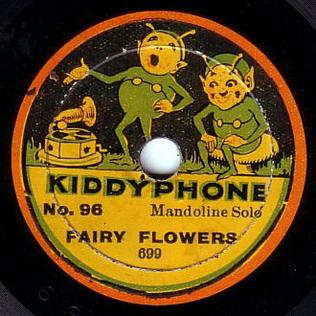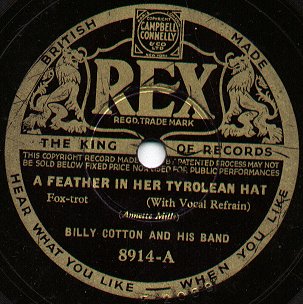Related Research Articles

Decca Records is a British record label established in 1929 by Edward Lewis. Its US label was established in late 1934 by Lewis, Jack Kapp and Milton Rackmil, who later became American Decca's president too. In 1937, anticipating Nazi aggression leading to World War II, Lewis sold American Decca, and the link between the UK and US Decca label was broken for several decades. The British label was renowned for its development of recording methods, while the American company developed the concept of cast albums in the musical genre.

Berliner Gramophone – its discs identified with an etched-in "E. Berliner's Gramophone" as the logo – was the first disc record label in the world. Its records were played on Emile Berliner's invention, the Gramophone, which competed with the wax cylinder–playing phonographs that were more common in the 1890s and could record.

Polydor Limited, also known as Polydor Records, is a German-British record label that operates as part of Universal Music Group. It has a close relationship with Universal's Interscope Geffen A&M Records label, which distributes Polydor's releases in the United States. In turn, Polydor distributes Interscope releases in the United Kingdom. Polydor Records Ltd. was established in London in 1954 as a British subsidiary of German company Deutsche Grammophon/Schallplatte Grammophon GmbH. It was renamed Polydor Ltd. in 1972. The company is usually mentioned as "Polydor Ltd. (UK)", or a similar form, for holding copyrights.

Deutsche Grammophon is a German classical music record label that was the precursor of the corporation PolyGram. Headquartered in Berlin Friedrichshain, it is now part of Universal Music Group (UMG) since its merger with the UMG family of labels in 1999. Deutsche Grammophon is the world's oldest surviving established record company. Presidents of the company are Frank Briegmann, Chairman and CEO Central Europe of Universal Music Group and Clemens Trautmann.

Columbia Graphophone Co. Ltd. was one of the earliest gramophone companies in the United Kingdom.
The Gramophone Company Limited , based in the United Kingdom and founded by Emil Berliner, was one of the early recording companies, the parent organisation for the His Master's Voice (HMV) label, and the European affiliate of the American Victor Talking Machine Company. Although the company merged with the Columbia Graphophone Company in 1931 to form Electric and Musical Industries Limited (EMI), its name "The Gramophone Company Limited" continued in the UK into the 1970s.

American Record Corporation (ARC), also referred to as American Record Company, American Recording Corporation, or ARC Records, was an American record company.
PolyGram N.V. was a multinational entertainment company and major music record label formerly based in the Netherlands. It was founded in 1962 as the Grammophon-Philips Group by Dutch corporation Philips and German corporation Siemens, to be a holding for their record companies, and was renamed "PolyGram" in 1972. The name was chosen to reflect the Siemens interest Polydor Records and the Philips interest Phonogram Records. The company traced its origins through Deutsche Grammophon back to the inventor of the flat disc gramophone, Emil Berliner.

Kiddyphone was a 1920s United Kingdom record label which issued small-sized gramophone records aimed at young children.
Mimosa was a 1920s United Kingdom record label which issued small gramophone records aimed primarily at children.

Imperial Records, the second United Kingdom-based label of that name, went into business in 1920. It was owned by the Crystalate Gramophone Record Manufacturing Company Ltd. of Tonbridge, Kent, England. The company's main recording studio was in London. Most Imperial issues were recorded by the company, but some issues from masters leased from other companies in continental Europe and from the United States' Banner Records which also appeared on Imperial.

Rex Records was a United Kingdom-based record label founded in 1933 by the Crystalate Gramophone Record Manufacturing Company, also the parent of British Imperial Records. Rex released their first discs in September 1933, with the initial release bearing a catalogue number of 8000 or 8001. The company was taken over by Decca Records in March 1937. Rex Records were sold at Marks & Spencer's chain stores.
Silvertone Records was a short-lived British department store record label, which was one of the house labels of Selfridges in the 1930s.
Decca Studios was a recording facility at 165 Broadhurst Gardens, West Hampstead, North London, England, controlled by Decca Records from 1937 to 1980.
Compo Company Ltd. was Canada's first independent record company.

Sir Edward Roberts Lewis was an English businessman, best known for leading the Decca recording and technology group for five decades from 1929. He built the company up from nothing to one of the major record labels of the world.
Crystalate Manufacturing Company Ltd. was a British plastics and later electronic components manufacturing company that operated in one form or another from August 1901 through August 1990. It is best known for its gramophone records made of moulded Crystalate plastic.
Crystalate is an early plastic, a formulation of nitrocellulose, camphor, and alcohol invented in the late 19th century and patented by American inventor George Henry Burt. It is best known as a material for gramophone records produced in the UK by Crystalate Manufacturing Company, and for moulded billiards, pool and snooker balls, as produced by the Endolithic Company.

Arthur Charles William Haddy was an English recording engineer. His work as Technical Director of the Decca Record Company Ltd. caused him to be nicknamed "the father of hi-fi".
Edison Bell was an English company that was the first distributor and an early manufacturer of gramophones and gramophone records. The company survived through several incarnations, becoming a top producer of budget records in England through the early 1930s until, after it was absorbed by Decca in 1932, production of various Edison Bell labels ceased.
References
- ↑ Hoffmann, Frank (12 November 2004). Encyclopedia of Recorded Sound. Routledge. ISBN 9781135949501 – via Google Books.
- 1 2 3 "The British Homophone Co. Ltd". Discogs. Retrieved 27 November 2023.
- 1 2 3 "Rollins House Conservation Comments" (PDF). Lewisham Council. 2014. Retrieved 11 November 2020.
- ↑ Scott, Jonathan (2023). Into the groove: the story of sound from tin foil to vinyl. London Oxford New York New Delhi Sydney: Bloomsbury Sigma. p. 272. ISBN 978-1-4729-7979-7.
- 1 2 "British Homophone and The Banba, Kilburn". kilburnwesthampstead.blogspot.com. Retrieved 27 November 2023.
- ↑ Nott, James J. (2002). Music for the People: Popular Music and Dance in Interwar Britain. OUP Oxford. p. 31. ISBN 9780191554971.
- ↑ Barfe, Louis (2013). Where Have All the Good Times Gone?. Atlantic Books. ISBN 9781782392194.
- ↑ Barfe, Louis (2013). Where Have All the Good Times Gone?. Atlantic Books. ISBN 9781782392194.
- 1 2 "Transpontine: British Homophone and the Black Vinyl Atlantic". Transpontine. 24 January 2021. Retrieved 27 November 2023.